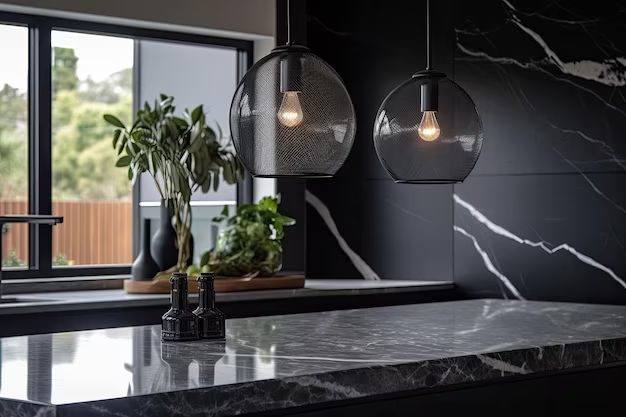Black granite countertops are a popular choice for kitchen remodeling projects due to their sleek appearance and durability. However, there are a few key factors to consider when deciding if black granite is the right material for your kitchen countertops.
Page Contents
Pros of Black Granite Countertops
Here are some of the benefits of using black granite for kitchen countertops:
- Aesthetics – Black granite has a beautiful, high-end look that can make a dramatic statement in your kitchen. The polished surface has a glossy shine that reflects light and accentuates the depth and richness of the stone.
- Durability – Granite is one of the most durable natural countertop materials available. It is incredibly hard and scratch-resistant, making it able to withstand years of daily use without significant wear and tear. Black granite is less prone to staining and etching than lighter granite colors.
- Easy maintenance – Black granite requires very little maintenance to keep it looking like new. Simply clean with mild soap and water on a regular basis. Re-sealing may be needed every 1-2 years to prevent staining and water absorption.
- Heat resistance – Granite can withstand heat up to approximately 450°F, making it an ideal surface for placing hot pots and pans after cooking without worry of damage.
- Adds value – Natural stone countertops like black granite add value and appeal to a home. This upgrade can significantly increase resale value down the road.
Cons of Black Granite Countertops
There are also a few potential downsides to consider with black granite:
- Cost – Natural stone is one of the more expensive countertop materials, so black granite can be a pricey investment. Expect to pay $80-$150 per square foot installed.
- Stains – While less prone to staining than lighter granites, black granite can still become stained from spills like wine, oil, and certain acidic foods if left for too long. Prompt cleanup is key.
- Seams – Natural stone has veins and color variations that require seams when installing full slabs. The seams may be slightly visible.
- Porosity – All granite is somewhat porous, which means it can absorb liquids if left unattended. Be sure to thoroughly reseal the stone regularly.
- Requires maintenance – To keep black granite looking its best, you’ll need to reseal it yearly and clean spills promptly to prevent stains.
- Can chip – While very durable, black granite can chip if subjected to heavy impacts. Use cutting boards instead of slicing directly on the counter.
Best Uses for Black Granite Countertops
Here are the best ways to utilize black granite countertops in your kitchen:
- Islands – A large black granite island makes a striking focal point in an open concept kitchen.
- Dark cabinets – Pairing black granite with dark wood or painted cabinets creates a bold, sophisticated look.
- Clean, modern spaces – The dark color and smooth surface complements modern, minimalist kitchen designs.
- High traffic areas – Good for busy spaces like around the cooktop that will see heavy daily use.
- Small kitchens – Black granite can make a small kitchen feel more streamlined.
How Much Does Black Granite Countertops Cost?
Here is a breakdown of estimated costs for black granite countertops:
| Type | Cost Per Square Foot (Installed) |
|---|---|
| Low-end black granite | $40 – $70 |
| Mid-range black granite | $70 – $120 |
| High-end black granite | $120 – $150 |
The total cost of your installed black granite countertop will depend on the type of granite slab selected, your kitchen’s dimensions, edge treatments like bevels or polished edges, and your location. Complex installations with many seams or special cutting around plumbing fixtures will also increase overall project costs.
How to Care for Black Granite Countertops
Caring for your black granite is simple with proper maintenance:
- Clean frequently with mild soap and water. Rinse well and dry completely.
- Seal granite every 1-2 years with a penetrating stone sealer.
- Immediately blot up spills, especially acidic substances like wine or fruit juice.
- Avoid using abrasive cleaners or scouring pads.
- Use trivets or hot pads under hot pans or appliances.
- Cut only on designated cutting boards, not directly on the counter.
- Re-hone and polish periodically to restore sheen.
Alternatives to Black Granite
Other dark-colored countertops to consider include:
Soapstone
Soapstone has an attractive, smoky grey coloration. It is softer than granite so more prone to scratches but is nearly impervious to stains and heat. Maintenance is also low.
Marble
Elegant marble has veining patterns that can complement a black granite island. Marble requires frequent sealing and can easily stain or etch.
Quartz
Engineered quartz comes in a wide array of dark greys and black colors. It resists staining and needs little maintenance but lacks the natural beauty of real stone.
Slate
Slate has an earthy, matte texture. It withstands heat and stains well but can chip over time. Slate needs periodic resealing.
Onyx
Onyx is a solid black stone with a distinctive translucent, glowing appearance. Onyx scratches and stains easily, requiring very diligent care.
Conclusion
Black granite countertops offer unparalleled elegance and drama to a kitchen design. They come in many distinct patterns and finishes to suit your personal style. While not inexpensive, black granite provides a durable, easy-care surface that can last for decades with proper maintenance. The striking sophistication of black granite makes it one of the most popular choices for high-end kitchen countertops.
